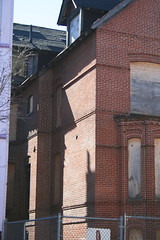Civic association conditions zoning support on vacancy
 At Tuesday night’s meeting of the LeDroit Park Civic Association, the association voted 11-2 to support the Howard University Campus Plan. Since several issues in the plan remain unresolved and unspecified, your author voted against supporting it.
At Tuesday night’s meeting of the LeDroit Park Civic Association, the association voted 11-2 to support the Howard University Campus Plan. Since several issues in the plan remain unresolved and unspecified, your author voted against supporting it.
Among many concerns are the several vacant properties that Howard University owns in the area. Though Howard has made a commendable effort to refurbish and sell many of these properties in LeDroit Park over the past decade, we are worried that the university, after it moves students out of Slowe and Carver Halls might leave these two dormitories vacant for several years.
The university has been very adept at finding excuses for keeping several of its properties vacant in decades past.
For current vagueness in the plan, university officials say they haven’t determined a use yet or that they haven’t found the financing or that everything is the economy’s fault.
That may be true, but vacant buildings attract trouble. They become safe-havens for criminals, vagrants, and rodents. Some vacant properties become truly blighted with windows covered up with plywood or metal covers. This blight drags down property values and lowers the quality of life.
For most private property owners, vacant properties (class 3) face a steep 5% annual property tax and blighted buildings (class 4) face a 10% annual property tax. These punitive tax rates are meant to urge owners of vacant and blighted properties to return their properties to good order and productive use.
As a university, however, Howard pays no taxes on its land, so a punitive 5% or 10% tax on $0 is still $0 . As such, the neighborhood needs a legal mechanism to ensure the university does not vacate Slowe and Carver Halls and then blame the economy as they board up the buildings for several years.
Whether the university keeps the buildings as student dorms or converts them to faculty housing is fine either way, but vacancy and blight threatens the progress the neighborhood has made over the past decade.
To prevent this, your author moved “To amend our support [for the campus plan] to prohibit vacancy of Slowe and Carver Halls for more than one year.”
The motion was property seconded and passed unanimously.
The civic association will submit this language to the Zoning Commission and urge the commission to attach it to the legally enforceable order that ratifies the campus plan. This will ensure that these two large dormitories do not sit vacant for an unreasonable length of time over the next decade.
Howard University’s campus plan is an ambitious and mostly good plan, but it’s important that point out its shortcomings and to ensure the university does not get away with undue burdens on neighborhoods and the District.
Exemption from property taxes is a privilege, not a right, and residents are wise to ensure this exemption is not abused to the detriment of the public interest.







The university should consider selling Slowe and Carver halls to a developer, that would make a significant investment in rehabilitating these two properties and converting them to rental apartments or condos. Not only would the properties be aesthetically more attractive, but they would also be maintained to a higher standard AND of course the developer would be paying property tax to the city.